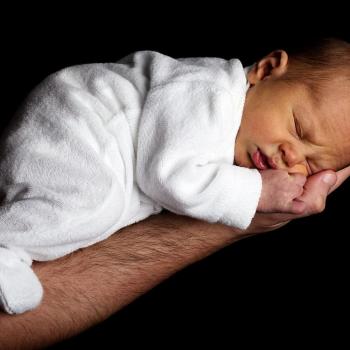Part One : Introduction
This is part one in a three-part essay on the question of abortion.
Story
John Keeler – who was known at ‘the Rebel Keeler’ because of his role in the Irish freedom movement from 1916 to 1922, was born on August 15, 1899. Here is John’s story.
His parents lived in a tiny village called, Tureeney, 6 miles from Galway city, in the West of Ireland. Each Saturday morning his mother, walked with a basket of eggs, to sell them in the market in Galway. On August 15, 1899, she was 6 months pregnant but set out for Galway and sold the eggs. However, she went into labor in the marketplace. With the help of other women, she delivered her baby, put him in the basket, and walked home to Tureeney. The baby was so small he couldn’t suckle on her breast, so for several weeks, she fed him through a turkey quill.
I knew John and his family well for over 40 years. On August 15, 1999, I celebrated mass, in his home, for him and his family on his 100th birthday. He lived for another year.
Debate, Discussion and Dialogue
When couples come to my office for counseling (I’m a licensed clinical psychologist as well as being a priest), one of the first things I do with them is a quick review of good communication. I give them a two-page handout with ten tips. Communication, of course, is more complicated than that but it helps to have a simplified summary that can easily be remembered, and which, if practiced, is very effective. Item number four on my summary involves detaching from a preconceived outcome when in discussion with another.
But there are two poles to the dance of detachment. No matter what the topic, if there are intelligent, moral, and spiritual people on both sides of the debate, then there must be some value in both positions. That is the first pole of the dance. So, I am far better served by trying genuinely to understand the value in my “opponent’s” viewpoint than in trying to cram my position down his throat. The wise one learns more from the fool than the fool learns from the wise one, for the wise one realizes that everyone can teach him something, while the fool thinks that nobody can teach him anything.
The second pole of the dance, however, is the truth that not all viewpoints are equally good or equally valid. For instance, the opinions of the Ku Klux Klan and of the MLK Jr. are certainly not equally valid when it comes to African American rights. Moreover, it is a performative contradiction and a logical fallacy to hold that all positions are equal because the one holding that view is elevating it above all other perspectives, thus contradicting the statement itself, that all perspectives are of equal value.
As we make moral choices, we have to negotiate the balance between these poles.
Life
Until I understand what life is, I can’t understand what ‘human life’ is, and if I can’t understand ‘human life,’ I can’t grasp what ‘personhood’ means, and then the “abortion debate” is mired in emotional charges and countercharges. So, when does life begin? It depends on whom you are listening to. Currently, the Roman Catholic Church teaches that life begins at conception: “There is no pre-existence, rather, at the moment of conception God creates a brand-new soul and infuses it into the zygote.” However, the Roman Catholic Church did not always hold that view. Thomas Aquinas (1225-1274), the “angelic doctor,” basing his work on contemporary medical “facts,” from postmortems on pregnant women, taught that it took 40 days for an embryo to develop into a medically recognizable boy, but 80 days to develop into a medically recognizable girl.
Another view is that life begins at the “quickening” or the time when a mother first feels movement in her womb. A third notion is that life begins at six weeks, when the heartbeat of the unborn can first be detected. Quite another notion is that life only begins when the fetus has reached viability. Given the advances in postnatal medical care, this is fast becoming a non-viable position! Still another notion is that life only begins when the freshly delivered infant takes its first breath.
Establishing when life begins is a tricky business. Moreover, I want to make an important distinction between ‘life’ and ‘human life’, between the native intelligence of an organism and the notion of ensoulment. I believe that everything on the planet is alive, whether it is a rose, an elephant, or a concert pianist. In fact, I see three kinds of intelligence: the creative intelligence which brought that life form into existence for the first time by setting up a morphogenetic field and a proto-template through which cosmic energy flowed, resulting in the physicalization of the idea; and secondly, a sustaining intelligence that enabled each created thing to thrive in its environment by harvesting what it needed via photosynthesis or mineral extraction, etc.; and thirdly, a re-gifting intelligence which, on the ‘death’ of the organism, distributed its molecular components into the ecosystem, while releasing its energy back into the cosmos for other creative endeavors. Thus, everything on the planet has life.
Human Life
At what stage is the zygote, embryo, or fetus regarded as human? A two-days-old zygote is very different from an 8-months-old fetus. There is a huge difference between a ‘morning after’ pill that vacates a zygote whose size is less than a period at the end of a sentence, and an 8-months-old fetus who is pulled piece by piece out of the womb during a ‘late term abortion.’
As for viability: Even a 2-year-old is utterly incapable of sourcing its own food, shelter, clothing, emotional support, so why not allow the mother – or a jealous sibling – to kill it?
This is a vital question and one that neither medical science nor the legal system can answer. It is a spiritual question, perhaps even a mystical question. When does human life, as distinct from the life of the ‘spacesuit’ begin? When does the soul arrive? At what stage, then, does abortion involve the taking of a human life?
Let me use an analogy. Four people are each building a house. John clears his site, but then somebody dumps a whole pile of garbage there; Judy digs her foundations and footings but somebody comes with a backhoe and fills them all in; James gets as far as framing and roofing his abode but somebody burns it to the ground; and Jennifer has completed her house and is living in it when somebody sets off a bomb as she sleeps. At what stage of the building process can the owner claim: “Someone is trying to trash my lot, or someone is destroying my house, or someone is making an attempt on my life!”
May society say to a female: “You are a woman; you’ve got a womb; bear children!” May society say to a male: “You are a man; you’ve got testosterone; bear arms!” Do both men and women have the right to say to society: “Take your laws off my body?”
Are we here as channels of life? And does that mean that women have to deal life through limitless birthing while men deal death through limitless killing? I believe that conceiving life and taking life are huge decisions with great moral, social and mystical repercussions.
Personhood and Ensoulment
In order to examine the notion of personhood we need to ask, who is a person? And who or what confers personhood? Is it a legal issue and therefore, either the lawmakers or attorneys get to decide when an entity is a human person? Or is it a biological issue to be decided by the medical community? Or is it, perhaps, a theological issue, and personhood can only be conferred by religious authorities? Or, maybe, it’s a private issue and only the pregnant mother can decide when it has ‘become a person’?
In the transition from life to human life to personhood, who is the arbiter? The awarding of the title ‘person’ has had a rather checkered career. Different cultures and different epochs have traversed that terrain at different speeds, but here, to simplify it greatly, is the basic chronology. The first beings to be awarded the title were male, adult rulers; next came all adult, freeborn males. Then, in 1865, after the Civil War in America, personhood was awarded to corporations. Next came ‘personhood’ for adult females. Before this time, they were the property of their husbands. Later, children were awarded personhood. And, finally, slaves were accorded this honor. A report from South Africa in the 1840’s showed the number of ‘big game’ shot by authorities and settlers. In one year, under the category ‘mammals’, the records showed: 400 Bushmen-females shot and killed. And when the British discovered Tasmania, they did not believe that the natives were human. To immortalize that attitude, having exterminated the lot, they sent the last two, a male and a female, to a taxidermist and then shipped the exhibits back to the British Museum. Only recently were these remains returned to Tasmania.
So, who confers personhood? Can it be withheld or withdrawn? Before females, children and slaves were accorded personhood, were they not people? And what happens when a regime rescinds personhood, as has occurred many times in human history? Typically, this process goes through four stages. Firstly, we de-humanize the person or group; then, we vilify them; thirdly, we ostracize them; and, finally, we exterminate them. Three examples will suffice to illustrate this: At the end of World War I, when the Ottoman Empire collapsed, 1.5 million Armenians were slaughtered; during World War II, six million Jews were exterminated; and in 1994, in a three-month period, 800,000 Tutsis were slaughtered by Hutu mobs.
Are we in danger of doing that to the unborn; deny them personhood, in the first place, or rescind a previous legislative recognition? Can we say that a fetus is a person if the mother is happy to continue the pregnancy, but is only a ‘clump of cells’ if the mother decides to abort it? Is biology a gift or a curse, whether you are male or female? Is gender a part of each individual’s carefully planned and enthusiastically embraced mission for any particular incarnation, or is it a cruel, sick joke perpetrated on us by a randomly evolving cosmos?
I have long held the belief that all souls make, what I call, ‘Pre-conception Contracts,’ with other souls – choosing its parents, siblings, culture, and time of entry. Are these volunteer souls who are aborted, thus denied incarnation and their mission thwarted?
Note: I will continue this essay in two more parts.
Image by Manuel Alejandro Leon from Pixabay

















